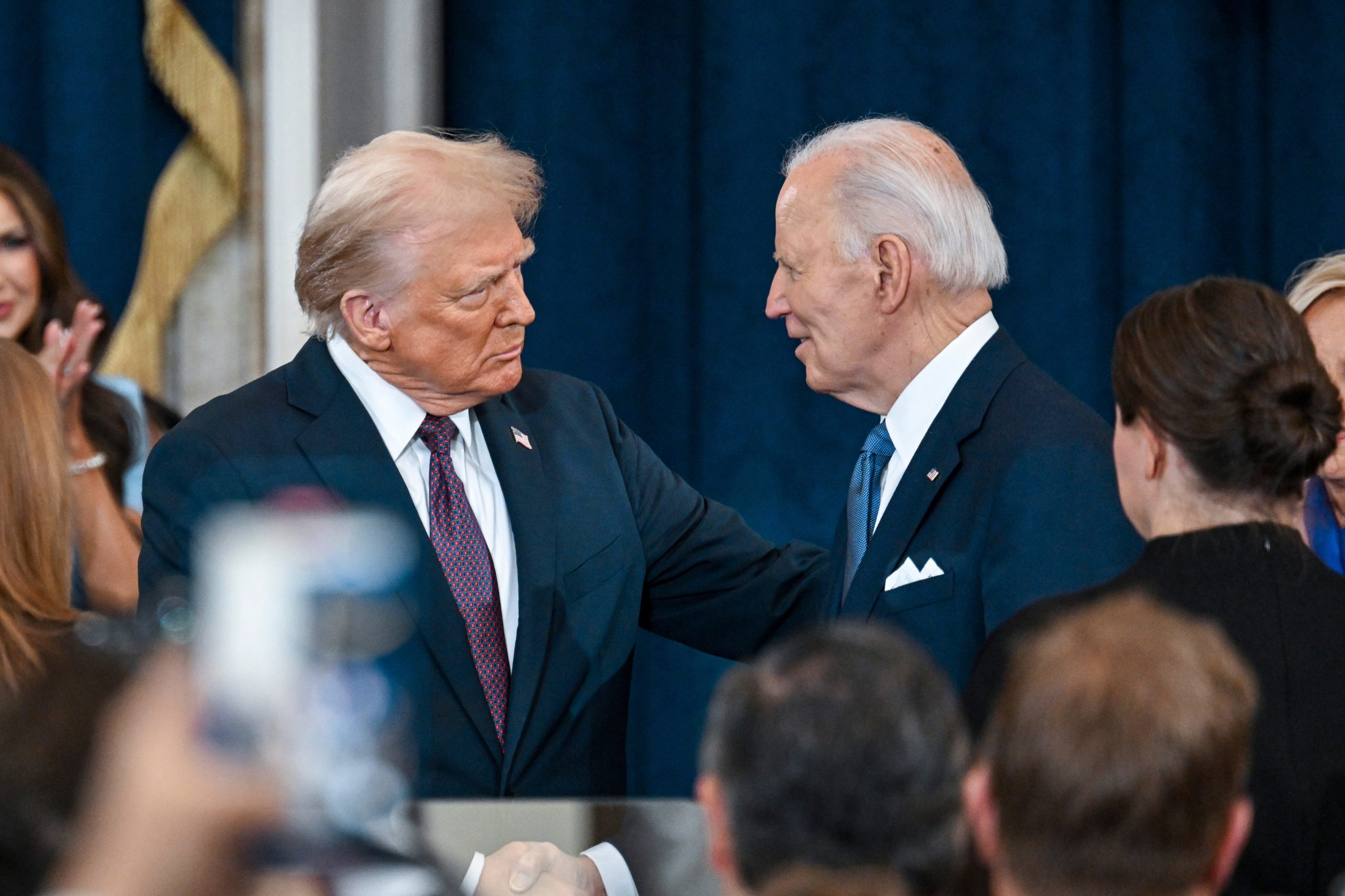Trump Revokes Biden’s Right to Receive Intelligence Briefings, Citing “Trust Issues”
In a dramatic and highly publicized move that has shocked political insiders, former President Donald Trump has announced that he is revoking a longstanding privilege typically afforded to all ex-presidents: the right to receive daily intelligence briefings. According to Trump, this decision comes on the grounds that President Joe Biden “cannot be trusted” with sensitive information, a claim that has ignited fierce debate across political circles.
This unprecedented action, which Trump has described as a necessary measure to protect national security, represents a significant departure from tradition. Historically, every former president is granted continued access to classified intelligence briefings as a courtesy, enabling them to stay informed on national security issues even after leaving office. However, in a series of posts on his Truth Social platform, Trump asserted that Biden’s actions and alleged shortcomings have necessitated a reevaluation of that policy.

The Announcement and Its Rationale
In his online posts, Trump stated, “There is no need for Joe Biden to continue receiving access to classified information.” He further elaborated that the decision was based on Biden’s “poor memory” as revealed by the recent Hur Report and criticized Biden for having allegedly set a precedent when he directed the Intelligence Community (IC) to restrict access for the 45th President—Trump himself—when he was in office. Trump’s rhetoric suggests that, in his view, Biden’s behavior over the past few years, including decisions related to the handling of classified files, makes him unsuitable for continued access to sensitive intelligence.
Trump’s comments appear to be part of a broader effort to discredit Biden and to differentiate his own vision for America from that of his predecessor. “Joe, you’re fired,” Trump declared in a tweet—a phrase that echoes his former catchphrase from the television show The Apprentice. The tweet not only served as a pointed jab at Biden but also as a symbolic declaration that Trump would no longer extend the same courtesies to Biden that have been the norm for former presidents.
Context: The Historical Precedent
Traditionally, the privilege of receiving intelligence briefings has been an informal but longstanding courtesy extended to former presidents, ensuring that they remain informed about critical national security matters. This practice is based on the notion that even after leaving office, former presidents possess unique insights into governance and national security that can benefit the country if they remain engaged with the intelligence community.
In a notable reversal, Biden had himself revoked Trump’s access to classified briefings in 2021, citing concerns over his “erratic behavior.” At the time, Biden questioned the value of continuing such briefings for someone he described as having little impact on current national security policy. Trump now appears to be returning the favor by stripping Biden of that same privilege—a move that marks the first time in history that a former president has been denied continued access to intelligence briefings based on personal trustworthiness.
Political and Legal Implications
Trump’s decision to revoke Biden’s access to classified information is likely to have wide-ranging political and legal ramifications. Critics argue that such a move undermines the established norms that have governed the treatment of former presidents, potentially setting a dangerous precedent for future administrations. Supporters, however, contend that national security considerations should override tradition, especially if there are legitimate concerns about a former president’s capacity to handle sensitive information.
Legal experts have already begun debating the ramifications of this decision. While the authority to grant or revoke such access ultimately rests with the executive branch, many question whether Trump’s unilateral action is legally sustainable or if it might eventually be challenged in court. The move raises important questions about the balance of power, the role of personal judgment in matters of national security, and the expectations placed on those who have held the nation’s highest office.
Reactions from Both Sides of the Political Spectrum
The political fallout from Trump’s announcement has been immediate and polarizing. Republicans loyal to Trump have largely hailed the decision as a bold and necessary step to safeguard national security, echoing Trump’s criticisms of Biden’s memory and alleged mishandling of classified materials. On the other hand, many Democrats and centrist observers have denounced the move as politically motivated and an abuse of executive power. Critics argue that by targeting Biden in this manner, Trump is further deepening political divisions and undermining the institutional norms that have long ensured a smooth transition of power and continuity of governance.
In statements to various news outlets, several prominent former intelligence officials expressed concern that politicizing access to intelligence could erode the credibility of the national security apparatus. They warned that if access to sensitive information becomes subject to political whims, it could undermine the integrity of intelligence sharing and put the country at greater risk.
Trump’s Broader Agenda
This latest action is not an isolated incident but appears to be part of a broader strategy by Trump to reshape the narrative surrounding his presidency and to contrast his approach with that of his political opponents. In recent months, Trump has been vocal about his plans to overhaul many of Biden’s policies, proclaiming the advent of what he calls “the golden age of America” under his leadership. Revoking Biden’s security clearance and access to intelligence briefings is a symbolic measure that aligns with Trump’s ongoing campaign to discredit his successor and to portray himself as the guardian of national security.
Trump’s social media posts have been filled with bold declarations and sharp retorts aimed at dismantling Biden’s credibility. By asserting that Biden “could not be trusted” with sensitive information, Trump is attempting to reinforce the idea that his own approach to national security is superior. His use of phrases like “JOE, YOU’RE FIRED” is a deliberate nod to his past, serving as both a personal vendetta and a broader political message.
The Impact on Biden and His Administration
For President Biden, this development poses both symbolic and practical challenges. Symbolically, being stripped of access to daily intelligence briefings is a significant blow, as it calls into question his judgment and ability to stay informed on critical national security issues. Practically, the loss of such briefings could hinder the administration’s ability to respond swiftly to emerging threats and to maintain continuity with the intelligence community—a body that has long provided invaluable counsel to the nation’s leaders.
Biden’s response to the situation has been measured. In interviews, he has downplayed the significance of the move, suggesting that the removal of intelligence briefing access is merely a procedural change that does not diminish his overall capacity to govern. However, political analysts note that the long-term implications of this decision could be far-reaching, affecting not only Biden’s relationship with the intelligence community but also the broader perception of his leadership on national security matters.
International Perspectives
Beyond the domestic political arena, Trump’s decision is likely to attract international attention. Allies and adversaries alike will be watching closely to see how this development influences the United States’ national security posture and its approach to intelligence sharing with foreign partners. Any indication that access to critical security information is being influenced by political considerations could have significant diplomatic repercussions. Foreign governments have long relied on the continuity of U.S. intelligence briefings as a signal of stability and trustworthiness. Should this precedent be allowed to stand, it might necessitate a reevaluation of international protocols regarding the sharing of sensitive information.
Historical Context and Future Precedents
Historically, the access granted to former presidents has been seen as an unspoken norm—a recognition of the unique insights that those who have held the nation’s highest office can provide. Over the decades, this practice has helped ensure that former presidents remain informed about matters of national security, even if they are no longer in active office. Trump’s decision to break with that tradition is unprecedented and could set a dangerous precedent. Future presidents might find themselves subject to similar treatment, depending on the political dynamics at play.
This action raises broader questions about the nature of presidential privileges and the delicate balance between ensuring national security and maintaining the integrity of democratic institutions. As debates continue and legal challenges loom, the nation—and indeed the world—will be watching closely to see how this controversy unfolds and what it portends for the future of presidential transitions and the continuity of government.
Conclusion
Donald Trump’s revocation of President Joe Biden’s right to attend daily intelligence briefings represents a significant and controversial departure from longstanding tradition. By asserting that Biden “could not be trusted” with sensitive information, Trump has not only made a personal statement but has also set in motion a debate about the limits of executive power, the role of personal judgment in national security, and the politicization of what has historically been a non-partisan privilege.
This decision, which has sparked fierce reactions from both sides of the political spectrum, carries profound implications for the current administration, for the future of U.S. intelligence practices, and for the integrity of the democratic process. Whether viewed as a necessary safeguard or a politicized overreach, the move is sure to be the subject of intense scrutiny and discussion in the coming months.
As the debate rages on, one thing remains clear: the intersection of politics and national security is a complex and often contentious arena, one in which the decisions made by our leaders can have far-reaching consequences for the future of our nation and our place in the world.

